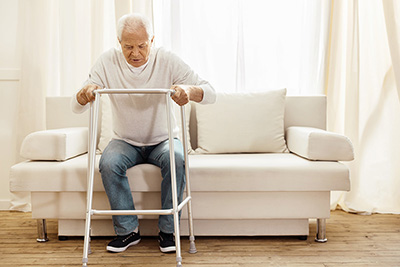Understanding Age-Related Decline in Strength and Balance: Importance of Fall Prevention and Medical Devices
Mon, Apr 1st, 2024
As we journey through life, our bodies undergo various changes, and one of the most significant transformations occurs as we age. With advancing years, many individuals experience a decline in strength and balance, which can significantly impact their quality of life.
Understanding the causes behind this decline, as well as the importance of fall prevention measures and the role of medical devices, is crucial in promoting healthy aging and ensuring well-being among seniors.
Causes of Age-Related Decline in Strength and Balance
Several factors contribute to the decline in strength and balance as individuals age:
Muscle Mass Loss: As we grow older, there is a natural decline in muscle mass, a condition known as sarcopenia. This loss of muscle tissue results in decreased strength and stability, making it more challenging to perform everyday tasks and maintain balance.
Bone Density Reduction: Aging is also associated with a decrease in bone density, leading to a higher risk of fractures and falls. Conditions like osteoporosis further exacerbate this issue, making bones more susceptible to injury even from minor falls.
Changes in Vision and Hearing: Diminished vision and hearing acuity are common age-related changes that can affect balance and coordination. Impaired sensory perception makes it difficult for individuals to navigate their surroundings safely, increasing the likelihood of falls.
Neurological Changes: Alterations in the nervous system, including a decline in proprioception (the body's awareness of its position in space) and slower reflexes, contribute to diminished balance control among older adults.
Chronic Health Conditions: Prevalent health conditions such as arthritis, diabetes, and cardiovascular diseases can impact mobility and strength, further increasing the risk of falls.
The Importance of Avoiding Falls: Falls among older adults represent a significant public health concern, with potentially severe consequences:
Physical Injuries: Falls can result in fractures, sprains, and head injuries, leading to pain, reduced mobility, and a decline in overall health.
Psychological Impact: Fear of falling can significantly affect an individual's confidence and independence, leading to social withdrawal and decreased participation in activities they once enjoyed.
Financial Burden: Fall-related injuries often necessitate medical intervention, rehabilitation, and long-term care, imposing financial strain on individuals and healthcare systems.
Reduced Quality of Life: The aftermath of a fall can diminish one's quality of life, limiting mobility, and hindering the ability to engage in everyday activities.
The Role of Medical Devices in Fall Prevention
Medical devices play a crucial role in mitigating the risk of falls among older adults and promoting safety and independence:
Mobility Aids: Devices such as walkers, canes, and wheelchairs provide support and stability, assisting individuals with balance issues to navigate their surroundings safely.
Home Modifications: Installing grab bars, handrails, and non-slip surfaces in bathrooms and other high-risk areas can prevent falls and enhance safety within the home environment.
Fall Detection Systems: Advanced technology-based solutions, including wearable devices and home monitoring systems, can detect falls promptly and alert caregivers or emergency services, ensuring timely assistance.
Orthopedic Supports: Braces, orthotic inserts, and compression garments help alleviate pain, improve joint stability, and reduce the risk of falls among individuals with musculoskeletal conditions.
Vision and Hearing Aids: Corrective lenses, hearing aids, and other assistive devices enhance sensory perception, enabling individuals to detect potential hazards and maintain balance more effectively.
Understanding the factors contributing to age-related decline in strength and balance is essential in developing strategies to promote healthy aging and prevent falls among seniors. By prioritizing fall prevention measures and leveraging the capabilities of medical devices, we can empower older adults to maintain their independence, enhance their safety, and enjoy a higher quality of life as they age gracefully. Let us strive to create environments and implement solutions that support aging populations in living their lives to the fullest, free from the fear of falls and injuries.
Contact Bell House Medical Today! We can make your home safer so you can live more independently with decreased fall risk.






